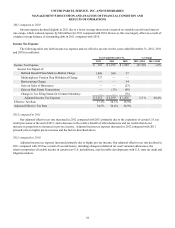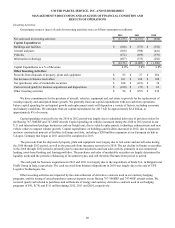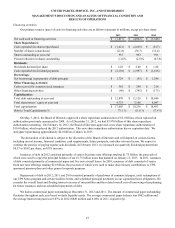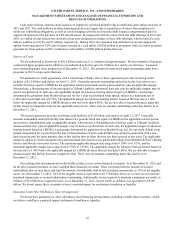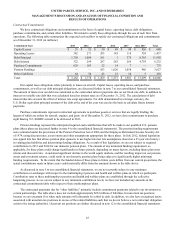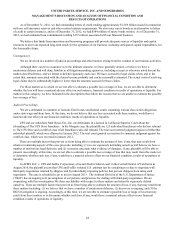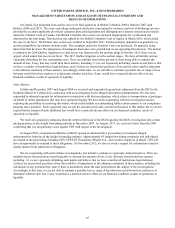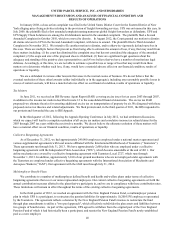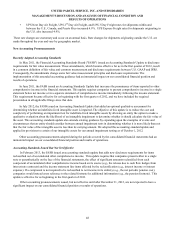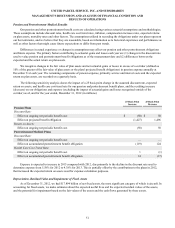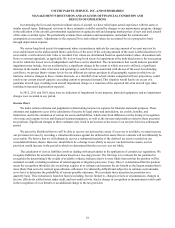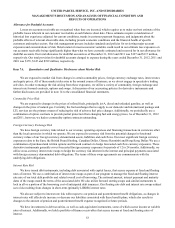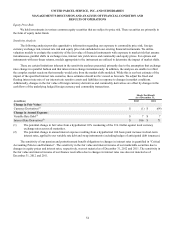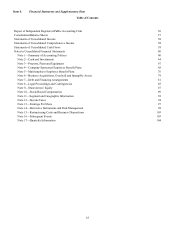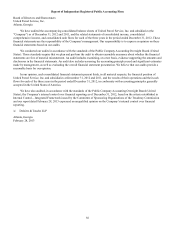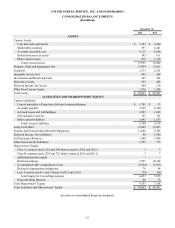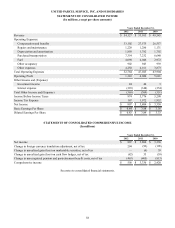UPS 2012 Annual Report Download - page 60
Download and view the complete annual report
Please find page 60 of the 2012 UPS annual report below. You can navigate through the pages in the report by either clicking on the pages listed below, or by using the keyword search tool below to find specific information within the annual report.UNITED PARCEL SERVICE, INC. AND SUBSIDIARIES
MANAGEMENT'S DISCUSSION AND ANALYSIS OF FINANCIAL CONDITION AND
RESULTS OF OPERATIONS
48
• UPS Next Day Air Freight, UPS 2nd Day Air Freight, and UPS 3 Day Freight rates for shipments within and
between the U.S., Canada, and Puerto Rico increased 4.9%. UPS Express Freight rates for shipments originating in
the U.S. also increased 4.9%.
These rate changes are customary and occur on an annual basis. Rate changes for shipments originating outside the U.S. are
made throughout the year and vary by geographic market.
New Accounting Pronouncements
Recently Adopted Accounting Standards
In May 2011, the Financial Accounting Standards Board ("FASB") issued an Accounting Standards Update to disclosure
requirements for fair value measurement. These amendments, which became effective for us in the first quarter of 2012, result
in a common definition of fair value and common measurement and disclosure requirements between U.S. GAAP and IFRS.
Consequently, the amendments change some fair value measurement principles and disclosure requirements. The
implementation of this amended accounting guidance had an immaterial impact on our consolidated financial position and
results of operations.
In June 2011, the FASB issued an Accounting Standards Update that increases the prominence of items reported in other
comprehensive income in the financial statements. This update requires companies to present comprehensive income in a single
statement below net income or in a separate statement of comprehensive income immediately following the income statement.
This requirement became effective for us beginning with the first quarter of 2012, and we have included the required
presentation in all applicable filings since that date.
In July 2012, the FASB issued an Accounting Standards Update that added an optional qualitative assessment for
determining whether an indefinite-lived intangible asset is impaired. The objective of this update is to reduce the cost and
complexity of performing an impairment test for indefinite-lived intangible assets by allowing an entity the option to make a
qualitative evaluation about the likelihood of an intangible impairment to determine whether it should calculate the fair value of
the asset. This accounting standards update also amends existing guidance by expanding upon the examples of events and
circumstances that an entity should consider between annual impairment tests in determining whether it is more likely than not
that the fair value of the intangible asset is less than its carrying amount. We adopted this accounting standard update and
applied its provisions to certain of our intangible assets for our annual impairment testing as of October 1, 2012.
Other accounting pronouncements adopted during the periods covered by the consolidated financial statements had an
immaterial impact on our consolidated financial position and results of operations.
Accounting Standards Issued But Not Yet Effective
In February 2013, the FASB issued an accounting standards update that adds new disclosure requirements for items
reclassified out of accumulated other comprehensive income. This update requires that companies present either in a single
note or parenthetically on the face of the financial statements, the effect of significant amounts reclassified from each
component of accumulated other comprehensive income based on its source (e.g., the release due to cash flow hedges from
interest rate contracts) and the income statement line items affected by the reclassification (e.g., interest income or interest
expense). If a component is not required to be reclassified to net income in its entirety (e.g., the net periodic pension cost),
companies would instead cross reference to the related footnote for additional information (e.g., the pension footnote). This
update is effective for us beginning in the first quarter of 2013.
Other accounting pronouncements issued, but not effective until after December 31, 2012, are not expected to have a
significant impact on our consolidated financial position or results of operations.


